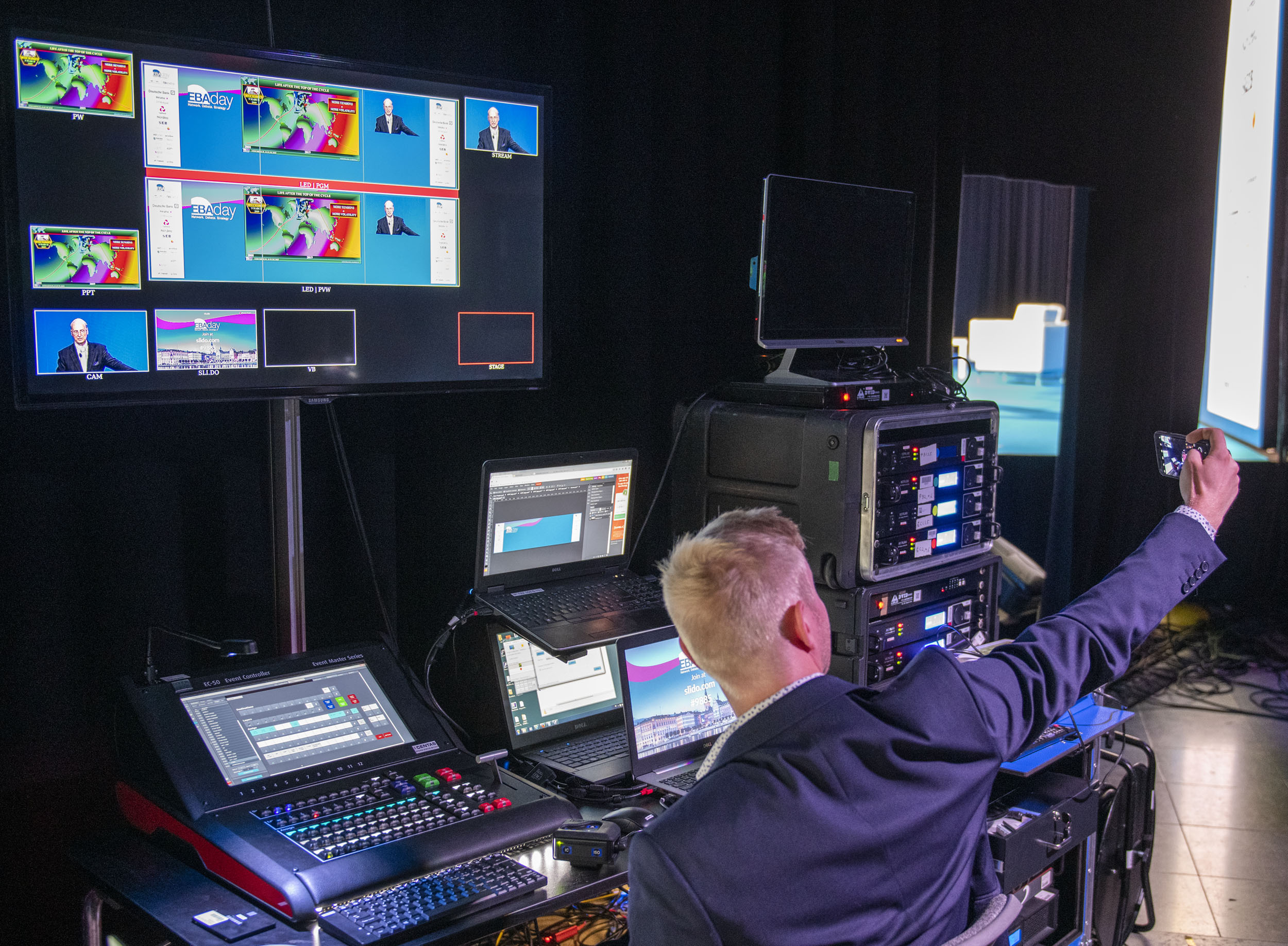AV technology/AV equipment

What is AV equipment?
AV technology stands for Audiovisual technology or equipment, which in simple terms means sound (audio) and image (visual) technology. AV equipment includes all the technical means used to enhance the audio and visual experience during an event. This includes, among others, projectors, speakers and microphones, but the technology is also found in computers, tablets and mobile phones. In other words, AV technology is constantly around us in today’s society.
Large events, galas and award ceremonies require a lot of planning and precision to be successful. A crucial part of this process is the use of audiovisual (AV) equipment. But what exactly is AV equipment and why is it so important? Let’s dive into the world of AV technology and its importance in ensuring your event is a success.
At Centas, AV technology means the various products and components we use to deliver a professional technology solution for conferences, meetings and live broadcasts.
Why is AV equipment important for events?
The quality of AV equipment can make or break an event. Without good enough sound and image quality, the audience may miss important parts of the presentation or performance, which can lead to disappointment and negative feedback.
Goals of good AV equipment
The aim of using professional AV technology is:
- Clean sound
- Clear images and presentations
- Sharing information without distractions
- Effective telephone and video conferencing
- Engaging conferences and events
Good AV equipment should be barely noticeable, it should work so smoothly that those attending the presentation don’t notice that there are microphones to spread the sound and screens to allow them to view the presentation, video or slides. Then the AV technology has done its job.

– Centas
“We would like to extend a big thank you to Centas for a professional, fast and carefully executed job of rigging Imagine Monet at Artipelag. It was an urgent job, but Centas impressed with their efficiency and quality. Their quick feedback ensured a smooth and successful process. Working with Centas has certainly exceeded our expectations! “
CEO – Artipelag
“The supplier exceeded our expectations. Friendly, service and solution-oriented staff and above all professional in the execution of the assignment. We are really satisfied and have already recommended others to contact them if they need similar services. “
Head of Unit HFA2.0, Nynäshamn municipality.
“Whatever you need to produce, Centas is not only a partner that handles your technology flawlessly so you can focus on the task of creating great content. They are also a shoulder to cry on, talented creators and last but not least, the gang that can make your powerpoint presentation as exciting as an action movie at the cinema. We used Centas for an event with 10,000 participants and we could not have asked for a better partner. “
Lecturer and moderator for Myflow
AV technology – Centa’s range
Centas has one of the widest ranges of AV equipment for rental in Sweden. We know what is required for a good overall solution and which products work best together. When you contact us, all you need to do is describe your goals and the context in which you need the technology. Based on that, we know what products you need and how we can best put together a package that suits you and your purpose.
Types of AV equipment
To understand the importance of AV equipment, we first need to familiarize ourselves with the different types of equipment commonly used at large events.
Sound system
The sound system is the heart of every event. It includes speakers, amplifiers, mixing desks and sound control systems that ensure every word and every note is heard clearly.
Lighting system
Lighting sets the mood and highlights important elements of an event. Different types of lighting, such as stage lights, spotlights and mood lighting, are used to create the desired atmosphere.
Monitors and projectors
Screens and projectors are used to show presentations, videos and live images. They play a crucial role in keeping audiences engaged and informed.
Microphones and wireless systems
Microphones, both wired and wireless, are essential for capturing and transmitting speech and music. Wireless systems provide flexibility and freedom of movement for presenters and performers.
Stage equipment
Stage equipment includes everything from the stage building and podiums to backdrops and decor. It is essential to create a visual setting and enhance the audience experience.
The hidden AV equipment
In the AV technology category, there are many small products that are often overlooked, but are crucial to bringing the whole together. With our expertise, we know exactly what it takes to get you a working solution.
Cables and adapters
In this category we find HDMI, VGA, USB and audio cables to connect your equipment. The cables required depend on the AV products you have in your solution. We have all types and sizes in this category.
Extension cords and power strips
AV technology solutions require a huge number of electrical outlets, often more than many of our customers realize. Extension cords and power strips are always part of an AV solution and we have countless of them.
Stand or rack
Tripods or different types of stands are used to hold cameras, microphones or projectors at the right height. This provides a stable image and eliminates the need for a person to hold the equipment.

Tips for using AV technology – for a professional presentation
Centas has many years of experience in delivering solutions with AV technology and over the years we have gathered a lot of tips on how to make a presentation successful. Here we collect some of the most valuable and best tips.
- Preparation: Test all equipment beforehand so that you feel comfortable and know how it works.
- Lighting: Adjust the lighting in the room to improve picture and sound quality.
- Sound levels: Adjust the sound so that it is clear, but not too loud.
- Focus: Make sure the image is clear and sharp by focusing the projector or large screen.
- Visibility: Position the screen so that everyone in the audience can see it and avoid getting in the way of the display.
- Timing: Practice giving the presentation within the specified time frame.
- Interaction: Engage the audience by asking questions, soliciting opinions and using interactive elements.
- Clarity: Strive to be clear and concise in your presentation and avoid unnecessary jargon.
- Body language: Use eye contact, gestures and movements to reinforce your message.
- Feedback: After the presentation, ask for feedback from colleagues or audience to improve your future presentations.
Tips for AV equipment – for large events
Large events require a little more than smaller presentations. Of course, you always want your event to be successful, but the more participants that attend, the more important it often is that events are successful. A larger audience also often means that more technology is required to ensure that more people can be reached by audio and video. When planning a large event, you need to have planned in detail, chosen your technology very carefully and ensure that you are in full control during the event itself.
Planning and preparation
Planning and preparing AV equipment for a large event requires accuracy and attention to detail.
Understanding the needs of the event
Each event is unique and requires specific equipment based on its format and content. It is important to understand the needs in order to choose the right equipment.
Choice of AV equipment
Choosing the right equipment is not just about having the latest gadgets. It’s about having the right tools for the job, to suit the size and nature of the event.
Budgeting and cost management
AV equipment can be expensive, so it is important to have a clear budget and to manage costs effectively. This includes considering renting versus buying and finding cost-effective solutions without compromising on quality.
Installation and testing
Installation and testing of AV technology are critical steps to ensure that everything works as it should.
Steps for installation
The installation process involves setting up the equipment on site, connecting all systems and ensuring that everything is set up correctly for the event.
The importance of pre-event testing
Testing is essential to identify and fix any problems before the event starts. This includes sound tests, light settings and image checks.
Common problems and solutions
Common problems can include anything from technical faults to poor acoustics. Having a plan to resolve these issues quickly is important to avoid disruption during the event.
During the event
During the event itself, the AV team must be prepared for everything.
Real-time monitoring
Real-time monitoring means keeping an eye on all equipment and making adjustments where necessary to ensure everything is working optimally.
Rapid problem solving
Being able to solve problems quickly and efficiently is crucial to avoid disruptions having a negative impact on the event.
Adaptations in place
Sometimes adjustments are needed on the spot to deal with unexpected changes or demands. Flexibility and quick adaptability are key.
After the event
Once the event is over, there are still important steps to take.
Dismantling and recovery
Dismantling and restoring equipment must be done quickly and efficiently to prepare for the next event or return rented equipment.
Evaluation and feedback
Evaluating what worked well and what can be improved is important to learn and improve future events.
Lessons learned for future events
By analyzing feedback and experiences, valuable lessons can be learned to help make future events even better.
The future of AV technology and events
Technology is constantly evolving and so is AV equipment.
New technologies and innovations
The future promises exciting innovations in AV technology, such as advanced AR and VR, that will change the way we experience events.
How technology is changing the events industry
New technologies are changing the way we plan and deliver events, with more interactive and engaging experiences for audiences.
Sustainable and environmentally friendly options
Sustainability is becoming increasingly important and AV equipment is evolving to be more environmentally friendly, with energy-efficient systems and recyclable materials.